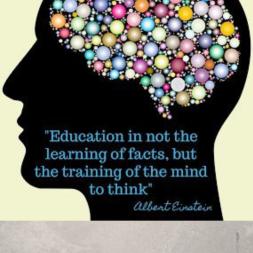
Creative, Critical, And Lateral Thinking For Inclusion
This course is for teachers and trainers in school education and adult educators in adult education.
Description
The new skills and competencies will be how to make the activities in lessons more creative and innovative, and activities more dynamic, interesting, and memorable.
Creativity and critical and lateral thinking are the most important skills in the 21st Century. These skills are necessary for 21st-century communication and interpersonal relationships, as well as for lifelong learning and employment.
The course is structured into 6 modules, each of which focuses on a particular area related to creative, critical, and lateral thinking.
Module 1: Creative thinking
Module 2: Critical thinking
Module 3: Lateral thinking
Module 4: Art as a form of expression of critical and creative thinking
Module 5: ICT tools to target and stimulate creativity and critical thinking
Module 6: How can integrate the competencies of critical and creative thinking in Project-based learning
Learning objectives
By the end of the course, each participant will be able to:
- learn how to apply critical, creative, and lateral thinking in their activities
- improve creative thinking skills and techniques
- develop tools and techniques for innovative problem-solving
- learn how to approach multiple intelligence theory
- improve language and communication skills
- increase capacity to cooperate on the international level
- get practical ideas for applying to PBL
- get to know and practice ICT tools for developing creativity and problem-solving
- enhance intercultural awareness
- increase internationalization at the level of education
- acquire practical language to be used in lessons, on new techniques and ideas
- understand the importance of critical and creative thinking in promoting inclusive education
Methodology & assessment
Materials, digital tools & other learning resources
We offer comprehensive support to participants in every aspect of their journey, including assistance with the procedural and administrative tasks involved in issuing and processing essential technical documents required by their home schools. This includes:
- 1. Certificate of Attendance
- 2. Europass Mobility Document
- 3. Learning Agreement
- 4. We supply tailored resources and materials to enhance the learning experience and align with course objectives.
Certification details
- Certificate of Attendance
- Europass Certificate (if requested)
Our courses are designed and delivered in compliance with the quality standards of the Erasmus+ Key Action 1 Quality Standards for Courses.
Pricing, packages and other information
-
Price:400Euro
-
Course package content:
The course fee is 80 euros per person per day, which includes:
- 1. Participation in the course sessions.
- 2. Coffee breaks provided after each daily session.
- 3. Accompaniment for a city tour to explore the local area.
What’s not included in the fee:
- 1. Entrance fees to museums and cultural sites during the city tour.
- 2. Some optional cultural activities may require an additional fee.
- 3. Accommodation, meals, and transportation are not covered and must be arranged individually by the participants.
-
Additional information:Description of the services and activities included in the course package (such as accommodation, meals, transport) or available at extra cost.
-
Cancellation & changes:
In the event of force majeure—such as natural disasters, pandemics, travel restrictions, or other unforeseen events beyond our control—we will:
1. Offer participants the option to reschedule for a future course date.
2. Provide a voucher for the course fee, valid for up to one year, to be used for any of our upcoming courses.
We are committed to maintaining flexibility and support for participants while ensuring a smooth and fair process for all parties involved.
-
Additional information:The options and conditions for change and cancellation, and the policy in case of unforeseen circumstances (force majeure).
Additional information
-
Language:English
-
Target audience ISCED:Lower secondary education (ISCED 2)Upper secondary education (ISCED 3)Post-secondary non-tertiary education (ISCED 4)
-
Target audience type:TeacherHead Teacher / PrincipalNot-for-profit / NGO staff
-
Learning time:25 hours or more
Upcoming sessions
More courses by this organiser

Digital Education and Artificial Intelligence Key Tools for Future Learning

Innovations In Mentorship & Coaching Dynamics In A Digital World


